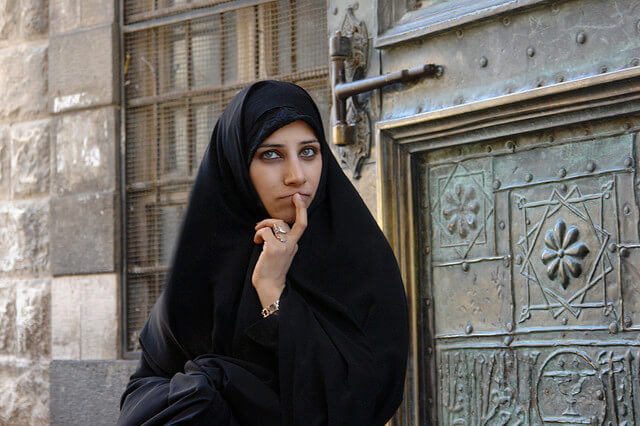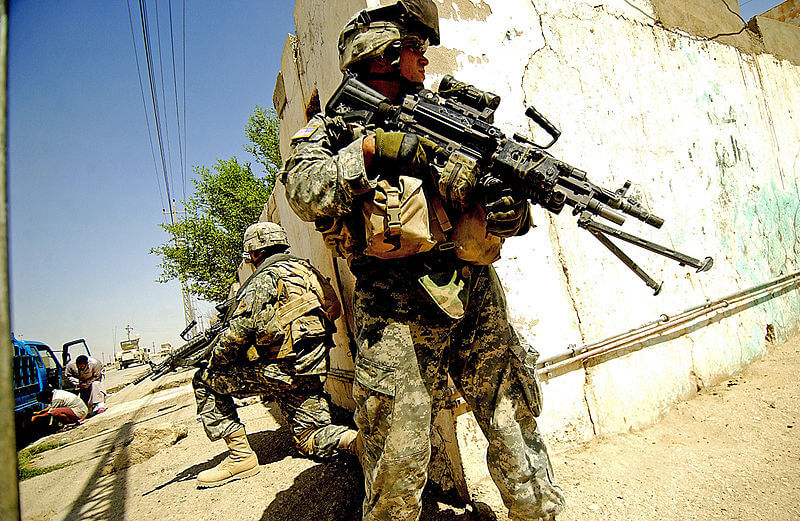
“2003 is a major crossroad for the life of every Iraqi woman.”
What were you doing on the day that Saddam’s statue came crashing down to change the face of Iraq? Do you have any reason to reach that far back into the past?
Chances are, if you’re like me, you don’t.
But it’s a different story for the seven Iraqi women who share so much of themselves in the documentary Ten Years of My Life by director Khalid Alzhraou. They don’t have the luxury of forgetting where they were on the 9th of April, 2003, when Saddam’s statue was cloaked in an imposing American flag and toppled to the ground, amid cheers from the crowd. This moment put a more defined target on their backs, one that remains and gives them reason to be afraid today
Fear for their loved ones, for their freedom, for their homeland. Fear deep enough to drown in.
The film explores how, by virtue of being born with a second x chromosome, these brave and intelligent women are made to feel small in their own skin – first under Saddam’s regime, and then living as women in a nation torn apart by war.
There’s the woman who loves wearing bright colours, who spends her time between Sydney and Baghdad, taking pride in her paintings. She swears that part of her hair turned grey on the night that Baghdad fell.
The photographer, who was 13 when the war began, and the foreign word “democracy” rolled strangely off her tongue. She hoped this new concept meant she could get away with pretty much anything, including being a rebel at school. The cheeky glint in her eyes makes even the most cynical of us smile.

By: Charles Roffey
The woman who has a way with words, as she explains that all Iraqi women, regardless of where they are from, are goddesses of love and war, with the same beating heart.
“The goddess of love gives life, she must be the goddess of war to protect that life.“
The university employee, whose legs won’t carry her properly since the day she received an envelope containing two bullets and a menacing note – a warning to her family to pack up and flee, or be killed.
The vivacious reporter, with fearless dreams, who refuses to let go of hope for her beloved Iraq. She quickly learned how to safely catch a cab by reading the face of the driver – a skill that many Iraqi women have now mastered. She will tell you in a matter-of-fact tone that mornings are safer than night for travel. “Every day can be like an Arabian night story”, she jokes, making you laugh, despite yourself.
The woman wearing the beautiful blue veil, who saw her beloved husband shot down and killed before her eyes. A part of her died on that day too.
And the mother who once found joy in preparing her daughter’s favourite meal, now sitting on the steps, weighed down by the memory of the sweet, lost child who lived her most beautiful days when she was in kindergarten. She will put bricks into your gut with her heavy words.
These are women of all ages, from different faiths and backgrounds, veiled and unveiled alike.
Their words carry the narrative in a powerful way, and images of everyday Iraqi women are scattered throughout the film – whether it’s the woman flicking through clothes at the market, or the girl laughing with the boy next to her – life goes on.
Their lives are inter-woven. They have different stories, but, beneath it all, they are the same woman.
Some speak with passion and anger, wearing the face of defiance. Others speak in a calm and almost detached way, as if to put a barrier between themselves and their memories, lest they be lost forever under the crushing weight of it all.
But, they all have the same haunted look in their eyes.
The film starts by introducing each woman, as she speaks about her reaction to the fall of Saddam. There are mixed feelings here. Saddam ruled with an iron fist, and so Iraqis went without many freedoms under his regime. As reporter Sabreen Kadum puts it, she felt caged in her home but she rejoiced when the crowd hit Saddam’s statue.

By: Lawrencema
“I thought at that moment if I was there I would do the same, but I would have said no to the soldier who put the [American] flag – and I would have hit the statue with my sandal.”
Iraqi women, however, enjoyed no amnesty from their despair. Photographer Noof Assi recalled feeling confused about the reason for which her mother, who hated Saddam, was shocked to see American soldiers in the street.
“Baghdad fell, but it’s not us who made it fall; it was the Americans who came and changed the regime. Now when I look at the situation, I understand her viewpoint. We would have not had the troubled security situation had the Iraqis toppled Saddam’s regime and not the US.”
She remembers what life was like under Saddam, and the packed theatre laughs as we hear the story of “Black Grape”. This was the code name her father used to hide his criticism of Saddam, in case the young Noof reported her parents’ betrayal of “father Saddam” to her teachers, as students were encouraged to do.
It’s good to find something in this film to laugh about because tears soon follow as one woman explains how she allowed her daughter to go to kindergarten, where she hoped she would be safe. Inana would flit about like a butterfly, preparing her clothes for the next day, matching shoes with hair clips. This makes her fate all the more difficult to swallow, as the audience learns that she was snatched by a gang and the footage cuts to a sea of graves.
This film will break your heart, but it will teach you about the strength of the human spirit – not just to survive, but to build lives that are worth fighting for, even in the face of ten years of despair. Ten years that now stretch on to an agonising present, and a bleaker future, as Islamic State militants seize control of northern Iraq and unleash devastation.
Despite the uncertain future, the women of this film refuse to surrender their hope for a brighter Iraq. They fight on. And half-way across the world, in a theatre at the Arab Film Festival, women and men of all backgrounds have gathered to bear witness to their stories. In that moment, we too are all Iraqi women, reliving ten years of horror, and a lifetime of hope.
Ten Years of my Life screens at the Arab Film Festival in Canberra on Saturday 30 August.
By Melissa Lahoud
Melissa is a chocolate-loving, star-gazing employment consultant who spends her time producing stories for The Wire radio program and loves nothing more than dirtying her hands in the garden.
